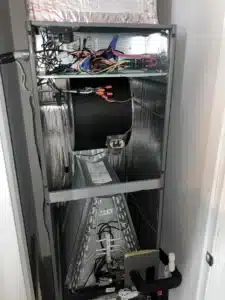The Importance of Coil Cleaning for Florida HVAC Systems
Florida HVAC systems work harder than those in almost any...
Understanding and prioritizing Indoor Air Quality (IAQ) is fundamental for creating a healthy and comfortable living environment. In this article, we’ll provide factual insights into the key aspects of IAQ, shedding light on why it matters and how homeowners can ensure the air they breathe indoors is of the highest quality.
Indoor Air Quality refers to the cleanliness and healthiness of the air within enclosed spaces, such as homes or workplaces. It encompasses various factors, including the presence of pollutants, humidity levels, ventilation, and temperature.
IAQ is directly influenced by the presence of indoor air pollutants. Common pollutants include dust, pollen, pet dander, mold spores, volatile organic compounds (VOCs) from household products, and particulate matter. Proper ventilation and filtration are crucial for reducing pollutant levels.
Poor IAQ can have significant health implications. Exposure to indoor pollutants can trigger or exacerbate respiratory issues, allergies, and other health problems. Long-term exposure may even contribute to more severe conditions, emphasizing the importance of maintaining clean indoor air.
Identifying and addressing sources of indoor air pollution is essential. Common sources include tobacco smoke, household cleaning products, cooking emissions, and building materials. Regular cleaning, proper ventilation, and the use of low-emission products contribute to reducing pollution sources.
Adequate ventilation is a cornerstone of good IAQ. Proper ventilation ensures the exchange of indoor and outdoor air, preventing the buildup of pollutants. Homes with inadequate ventilation may experience issues like high humidity levels and a concentration of indoor pollutants.
Controlling humidity is crucial for maintaining optimal IAQ. Excessive moisture can lead to mold growth, while low humidity can cause discomfort and respiratory irritation. Using dehumidifiers and ensuring proper ventilation help regulate humidity levels.
Air filtration systems, such as HVAC filters, play a vital role in trapping and removing airborne particles. Regular filter replacement is essential for ensuring the effectiveness of these systems in reducing pollutants and maintaining clean air.
Employing effective ventilation strategies enhances IAQ. This includes using exhaust fans in kitchens and bathrooms, opening windows for fresh air, and investing in mechanical ventilation systems. These measures help dilute pollutants and ensure a continuous flow of clean air.
Routine maintenance of HVAC systems is paramount for preserving IAQ. This includes cleaning ductwork, inspecting and replacing filters, and ensuring that all components function optimally. A well-maintained system contributes to efficient ventilation and pollutant removal.
Homeowners can monitor IAQ using indoor air quality monitors. These devices measure key parameters like particulate levels, humidity, and VOC concentrations. Based on monitoring results, homeowners can implement targeted solutions, such as air purifiers or specific ventilation adjustments.
Indoor Air Quality is a multifaceted aspect of home comfort that directly impacts the health and well-being of occupants. By understanding the sources of indoor air pollution, implementing proper ventilation strategies, maintaining HVAC systems, and monitoring IAQ, homeowners can create a living environment that promotes clean and healthy indoor air. Prioritizing IAQ is a proactive step towards ensuring a comfortable and safe home.

Florida HVAC systems work harder than those in almost any...

Indoor air quality plays a major role in how a...

Ventilation is one of the most important yet often overlooked...

In Florida, air conditioning is not a luxury. It is...

Many homeowners assume that central air conditioners pull fresh air...

Preventive AC maintenance plays a major role in keeping cooling...